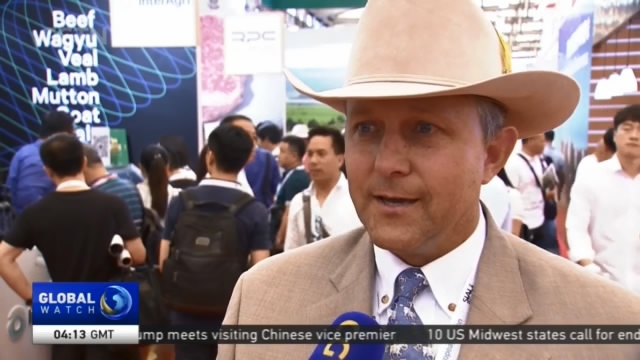
13:26, 18-May-2018
Room for Growth: World exporters at SIAL aim for China market
02:55

China has been lowering the barriers of entry for imported food. Many global companies are taking this opportunity to enter such an enormous market. Yang Chengxi reports from Asia's largest annual food and beverage trade show in Shanghai, and tells us how things are set to change – especially for the beef industry.
Packed with food exporters from around the world, this is SIAL, Asia's largest annual food and beverage trade show. With China being one of the world's largest food importers, it's no surprise this event has attracted over 100-thousand participants from 67 countries and regions.
In 2018, China lowered tariffs on more than 8,500 imported items in the consumer sector, from an average of about 17.3 percent to 7.7 percent. The tariff cut, which includes foreign food items, was the third one since 2015. And exporters are capitalizing on this more open market.
YANG CHENGXI SHANGHAI "It is the show's nineteenth year already, but there's one group of American businesses which is new to this event."
They are US beef producers. This industry has been under spotlight as China finally greenlit American beef imports in 2017, and then later slapped potential retaliatory tariffs. Despite that, many American businesses are making the trip here to court Chinese clients.
STACY DAVIES CEO, COUNTRY NATURAL BEEF "We are hoping to export beef into China soon, 800-thousand pounds a month would be a significant number. We'll look for ways to reduce overtime costs including tariffs and we are really hoping that the trade arrangements can be settled soon so that the tariffs can decline. We want a relationship that lasts generations into the future, and we are willing to be patient and take the time to do that."
Currently, US beef is already priced higher than many of their competition. And farmers hope their grain-fed cows will catch the eye of higher-end customers, who might be willing to pay more.
YANG JIAN EXECUTIVE CHEF, PC WOK "US beef accounts for about 40 percent of our offerings. Grain-fed beef is generally juicier than grass-fed ones because they are more fatty."
Currently, 34 US companies are licensed to sell beef to China, including Tyson, America's largest meat producer. Although recent trade tensions have cast a shadow over the trade, Tyson still remains confident in the Chinese market.
GRACE XIE, DIRECTOR TYSON FOODS "Consumer reception has been better than we anticipated. We estimate our shipments to China will double in the second half this year."
US beef imports to China in the first quarter of 2018 already reached half the total volume of last year. Most exporters at SIAL believe the short-term trade friction should not be the reason to turn away from the long-term opportunity in China.
YCX, CGTN, SHANGHAI.

SITEMAP
Copyright © 2018 CGTN. Beijing ICP prepared NO.16065310-3
Copyright © 2018 CGTN. Beijing ICP prepared NO.16065310-3